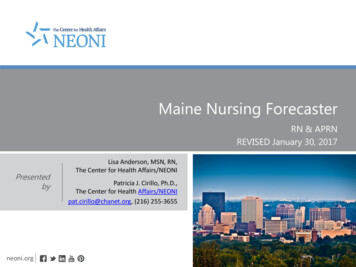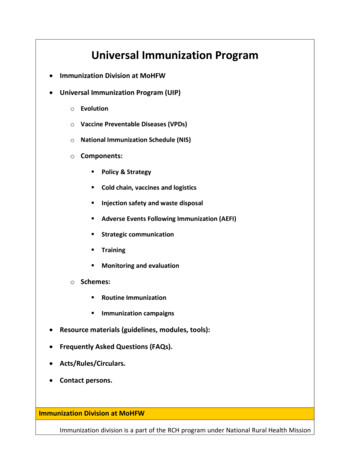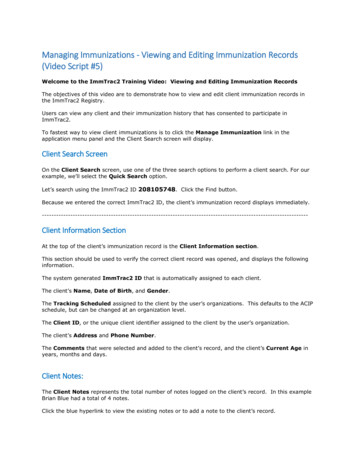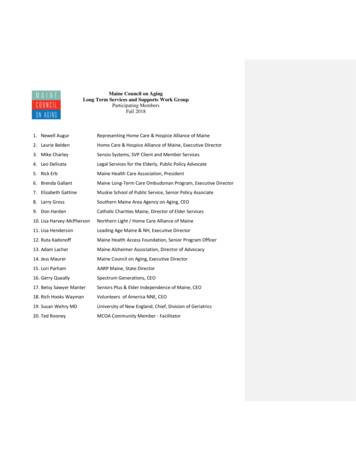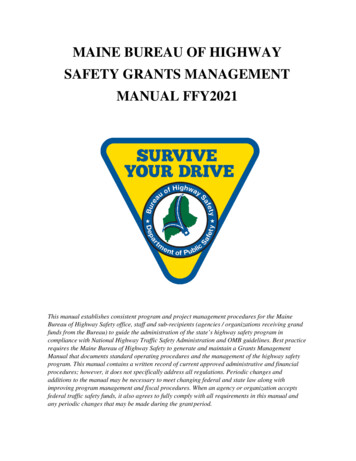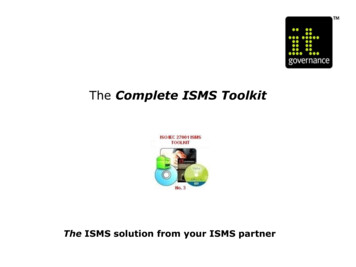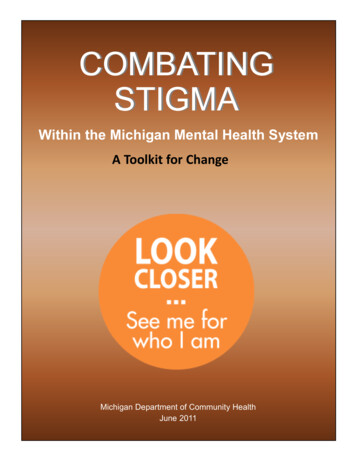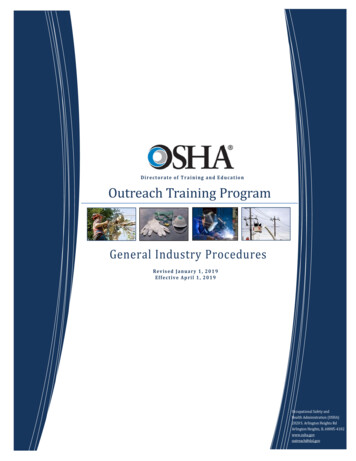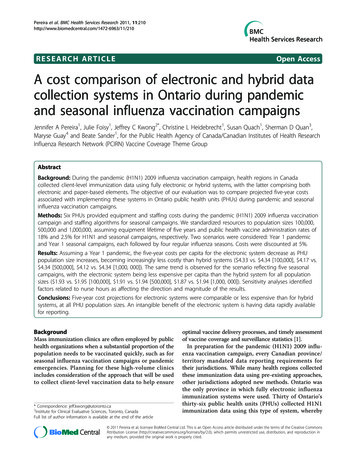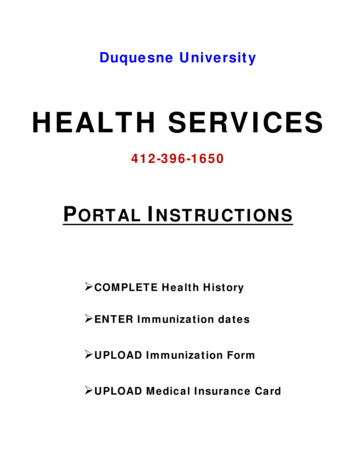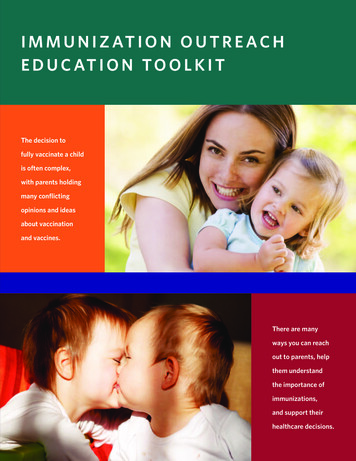
Transcription
I M M U N I Z AT I O N O U T R E A C HE D U C AT I O N T O O L K I TThe decision tofully vaccinate a childis often complex,with parents holdingmany conflictingopinions and ideasabout vaccinationand vaccines.There are manyways you can reachout to parents, helpthem understandthe importance ofimmunizations,and support theirhealthcare decisions.
KEEP MAINE’S CHILDRENS A F E A N D H E A LT H YImmunizations keep Maine’s children healthy, protecting them from dangerous diseases.In the last 50 years, childhood vaccination programs have prevented millions of deaths,improved hundreds of millions of lives, and saved billions of healthcare dollars.But today, we face a growing problem.Over the past decade, childhood vaccination rates have been falling in Maine, as in manyother areas across the country, due to increased parental hesitancies to immunization.A recent estimate indicates that 20,000 children aged five or younger in Maine areexposed to the risk of contracting vaccine-preventable diseases.Improving childhood vaccination rates has become a priority of state, local, andprofessional health and public health organizations.Will you help us keep Maine’s children safe and healthy?2
R E A C H O U T T O FA M I L I E SWith this toolkit, you can help families in your area stay healthy!There are many ways you can reach out to parents, help them understand the importanceof childhood immunizations, and support their healthcare decisions. A good first step is tolearn more about the families that live in your area. To develop an effective outreach andeducation campaign, follow the simple steps below:Turn to page 4to learn the reasons why some Maine parents chose to skip or delay childhoodimmunizations.Turn to page 5to learn about messages that help parents make the decision to vaccinate their children.Turn to page 6to learn about the different “audiences” for your outreach and education campaign.Turn to page 7to identify which types of parents with young children live in your area.Turn to page 8to determine what types of outreach activities are best to use with the parents in your area.Access the enclosed CDfor templates of outreach tools and activities that you can customize to suit your needs.3
T H E D E C I S I O N T O VA C C I N AT ERecent surveys show that the majority of Maine parents believe in the health protectionof childhood immunizations, the value of physician recommendations about vaccinations,and the risks posed to children by vaccine-preventablediseases. However, these surveys also show that parentswhose children do not have all of their immunizations areless likely to share these beliefs.WHAT IS AN ALTERNATIVE OR DELAYEDSCHEDULE? Some parents choose not tofollow the recommended vaccine schedule,and skip or delay some or all of theirThe decision to fully vaccinate a child is often complex,with parents holding many conflicting opinions and ideasabout vaccination and vaccines. The most commonchildren’s immunizations. This scheduleleaves children vulnerable to dangerousdiseases for a longer period of time thannecessary and lacks medical benefit.barriers to parents fully vaccinating their children include: Believing vaccines are not safe Believing vaccines are not necessary to keep children healthyFor many parents, the issues of safety and necessity are intertwined. Parents who saythat vaccinations are unnecessary for their children may actually feel the benefits ofimmunization are outweighed by perceived health risks. Safety and necessity concernscan also influence parents to choose an alternative or delayed immunization schedule.Information about vaccination decisions and effective messages came from research conducted with parents ofyoung children throughout the state by the Maine CDC’s Maine Immunization Program. In 2007, parents weresurveyed by phone and mail to identify barriers and incentives for immunizing their children. Building upon thisresearch, intercept interviews were conducted in 2011 to both clarify survey data and test potential messages.To learn more about this research, visit: zation4
C O M M U N I C AT I N G W I T H PA R E N T SA B O U T C H I L D H O O D I M M U N I Z AT I O NThe most important message you can communicate to parents is to talk to theirhealthcare provider about their immunization concerns. Healthcare providers areresponsible for the health and safety of their patients and are best equipped to answerparents’ specific questions about vaccines, the vaccination schedule, and immunization.When developing outreach materials, focus messages on the safety of vaccines andtheir necessity for children’s health. Emphasize the importance of maintaining the CDCrecommended immunization schedule and avoiding alternative or delayed schedules.Pushy or scary messages don’t work with Maine parents. Neither do messages thatplace immunization decisions in terms of “good” or “bad”. Focus instead on the positivebenefits of vaccines to child health and well-being.The samples below—which are included as digital files on the enclosed CD—illustratethe types of messages and images that will be most effective with Maine parents.Think measlesare a thingof the past?Think again.M E A S L E S A R E S T I L L A R O U N D, A N D S T I L LA T H R E AT TO YO U R B A B Y ’ S H E A LT H .I S YO U R B A B Y U P TO DAT E ? A S K YO U R D O C TO R .Thinking of delaying vaccinations?Don’t compromise. Immunize.Every vaccine is needed to protect your baby from dangerous,even deadly, disease. Is your baby up to date? Ask your doctor.5
A B O U T M A I N E PA R E N T SFamilies, like individuals, have personalities that influence how theyreceive information, perceive themselves and others, participate intheir communities, and make decisions about their families’ health. InMaine, these families can be organized into five groups called “targetaudiences”. Successful outreach campaigns use strategiesdesigned to motivate each target audience.The target audiences of parents with young childrenin Maine include: own Choice: Middle-age, college-educated, upper-middle-income parents with smallTfamilies. Town Choice enjoy interacting with others in their community, but makedecisions based on their own analysis and interpretation of the evidence. ural Legacy: Middle-age, high-school-educated, lower-middle-income parents withRseveral children. Rural Legacy make decisions using the “rules” they’ve learned from theirlife experiences to understand and organize the world around them. own Legacy: Young, high-school-educated, low-income parents with large families.TTown Legacy trust the advice of leaders in their family or community with similar lifeexperiences to their own and will use that advice to guide their decisions. econd City Transitional: Young, low-income parents with some college education andSfew or no children in the house. Second City Transitional make decisions based on thepromise of immediate benefit for themselves and their families. Rural Choice: Middle-age, upper-middle-income parents with some college educationand several children in the house. Rural Choice use “rules”—derived from establishedtraditions in religion, local economy, inter-family dynamics, etc.—to make decisions.6
FA M I L I E S I N Y O U R A R E AIdentify the different target audiences living inyour area using the map below.7
M A I N E TA R G E T AU D I E N C E S AT A G L A N C EChoose outreach strategies based on the kinds of families living in your community.AUDIENCETOWN CHOICERURAL LEGACYPROFILEAge 25–44Age 25–44College graduatesHigh school graduatesUpper-middle incomeLower-middle incomeSmaller family sizeSeveral children in thehouseholdLOCATIONConcentrated along the coastFound throughout the stateaway from the coastTYPES OF OUTREACHPrint (mailers, newspapers,magazines, banners, posters,brochures, etc.)Print (mailers, newspapers,brochures, posters, yard signs,etc.)Electronic (listservs, emails,websites, web banners, phonecalls)Electronic (emails, websites,web banners, listservs, phonecalls)Event (discussions, sportingevents, movie previews,celebrity appearances, etc.)Event (celebrity appearances,political events, art/culturalevents, etc.).Email series from expert source,with opportunity for parentfeedback loopLocal “celebrity” (political,church, etc.) endorsementSUGGESTED STRATEGIESNewspaper Op-Ed’s by experts8“Lead by example” campaignincluding stories from localinfluential figures
TOWN LEGACYSECOND CITY TRANSITIONALRURAL CHOICEYounger than age 35Younger than age 35Age 25–44High school graduatesSome college educationSome college educationLow incomeLow incomeUpper-middle incomeLarger family sizeSingles, couples, and smallerfamiliesSeveral children in thehouseholdFound in parts of WesternMaine and Aroostook andWashington CountiesFound primarily inCumberland CountyFound in York andAndroscoggin CountiesPrint (mailers, newspapers,point of purchase displays,brochures, etc.)Print (newspapers, mailers,yard signs, banners, posters,point of purchase displays, etc.)Print (mailers, brochures,point of purchase displays,magazines, etc.)Electronic (emails, phone calls/messages)Electronic (phone calls, emails,websites, web banners, listservs,text messages)Event (art/cultural events,award ceremonies, celebrityappearances, etc.)Event (discussions, awardceremonies, art/cultural events,etc.)“Good neighbor” peer-to-peercampaign sharing immunizationinformationEvent (discussions, civic events,educational events, etc.)Advertisements in independentlocal mediaFamily outdoors/sportingevent promotionSocial media campaignMailer with emotional appealCommunity-based events suchas town days9
R E A DY TO S TA RT H E L P I N G K E E PM A I N E C H I L D R E N H E A LT H Y ?Start planning your outreach campaign using the information in this toolkit andon the enclosed CD. If you do not have a lot of experience with performing outreach,don’t worry—it’s easier than you think! Remember to:1. Identify the area that you would like to focus on for your outreach activities.2. Identify the Target Audience families living in those areas using the map on page 7 andgain more in depth information using the county specific maps on the enclosed CD.3. Determine what types of outreach activities are best for the Target Audience families inyour area using the chart on page 8 and gain more in depth information using the TargetAudience profiles on the enclosed CD.4. Plan events and create materials for your Target Audience families. Use the samplematerials on the enclosed CD to guide you, such as: Sample posters, Sample media pitch, and Sample newsletter items.10
To learn more about this campaign, contact the Maine Immunization Program at207-287-3746 or visit zation11
Families, like individuals, have personalities that influence how they receive information, perceive themselves and others, participate in their communities, and make decisions about their families' health. In Maine, these families can be organized into five groups called "target audiences". Successful outreach campaigns use strategies
